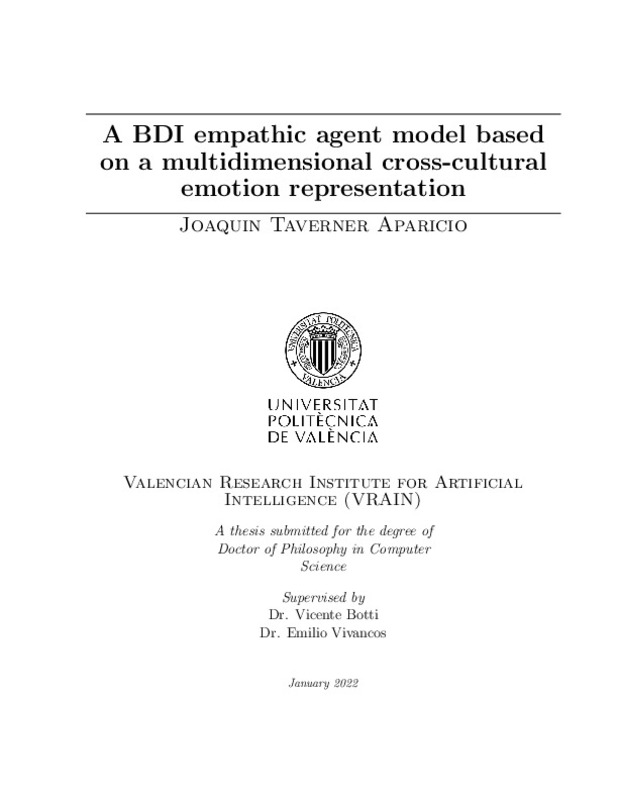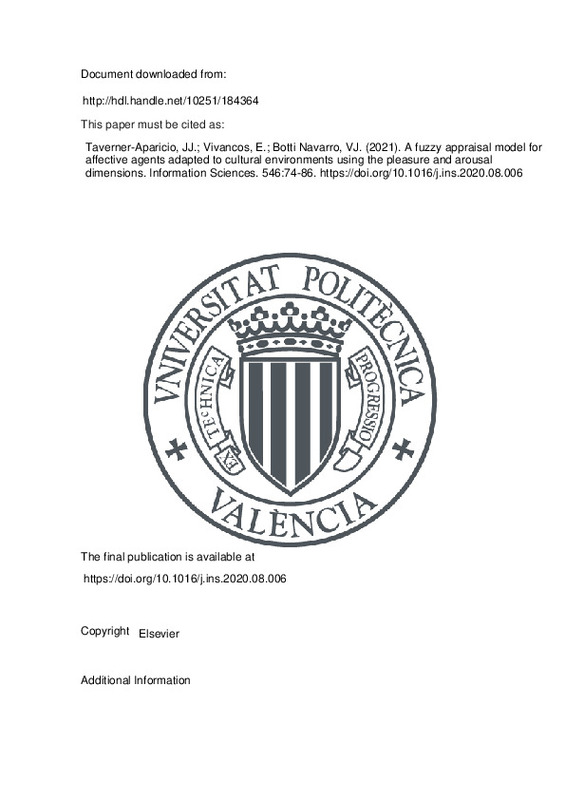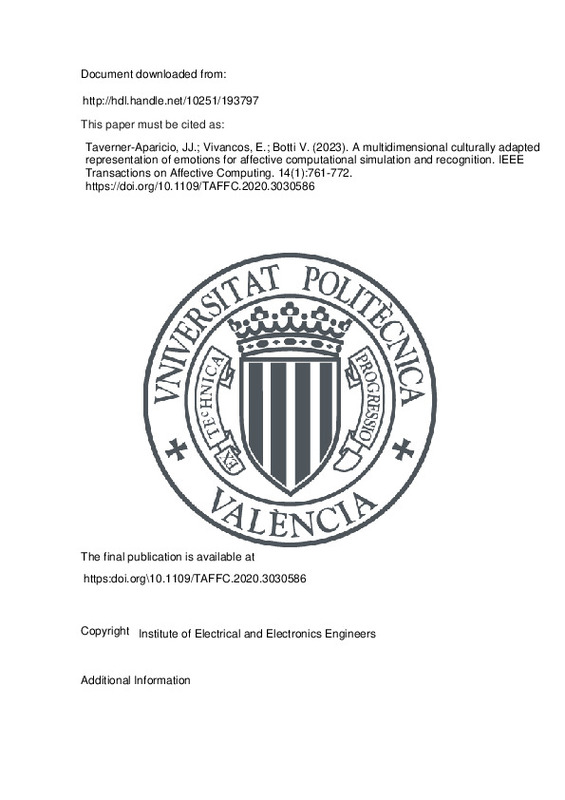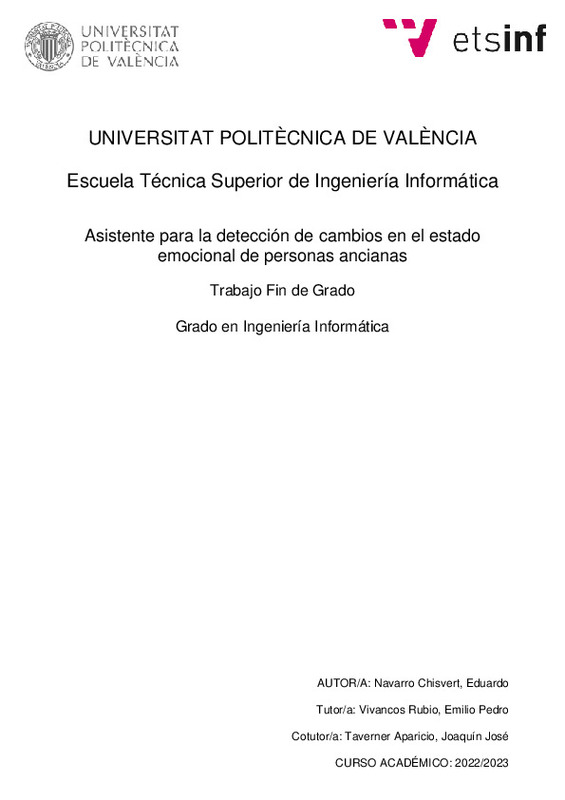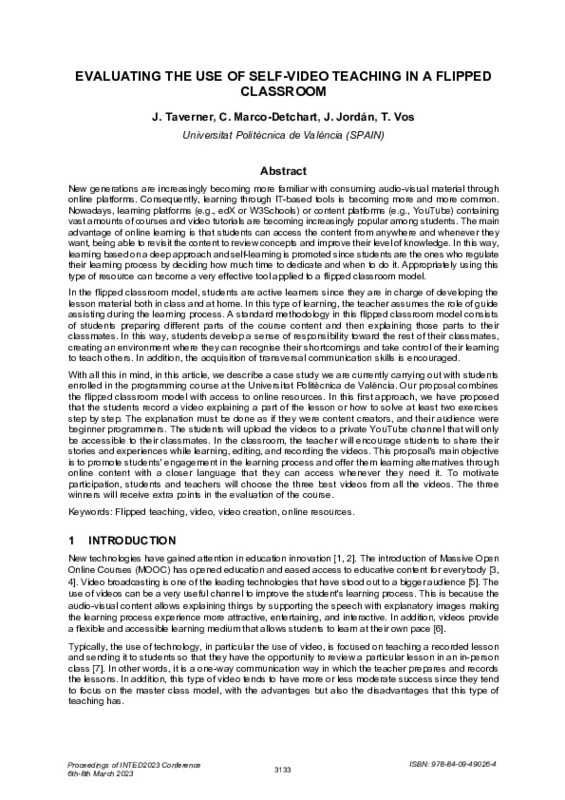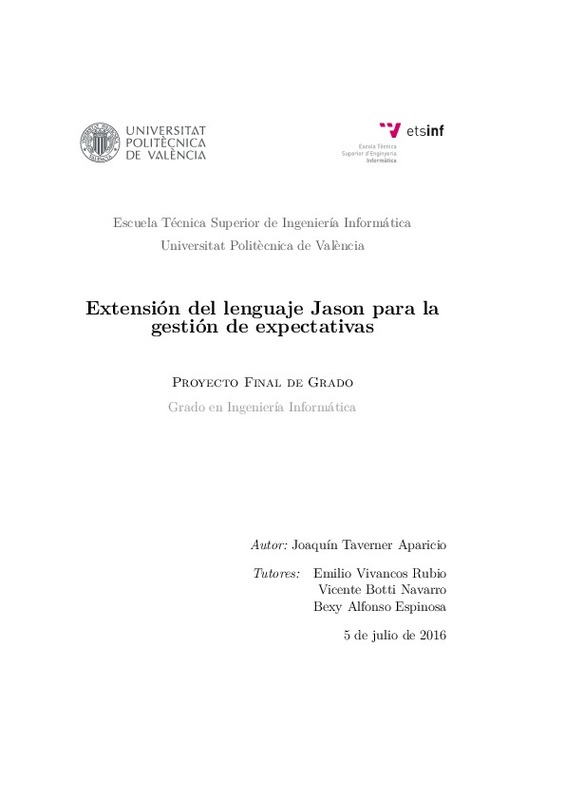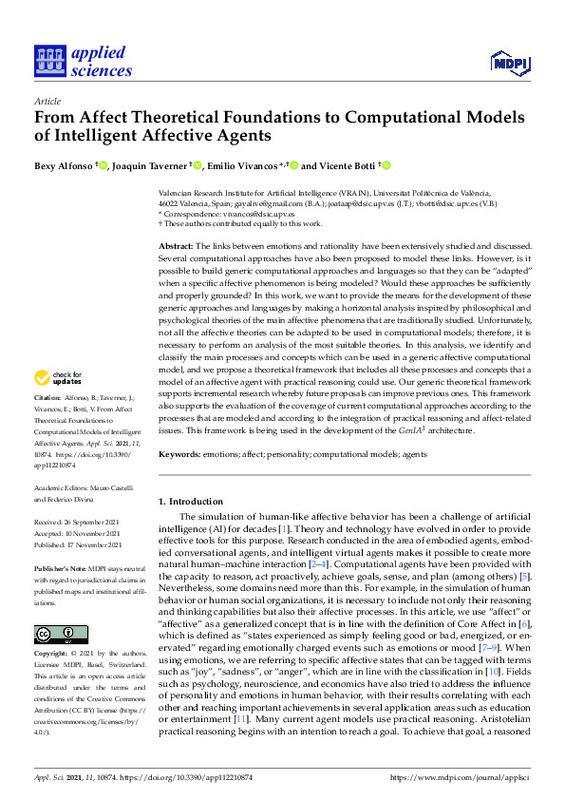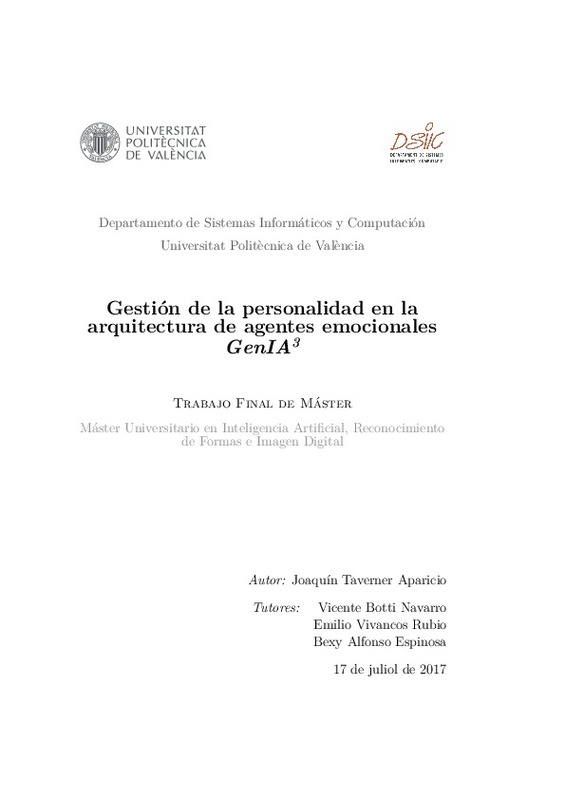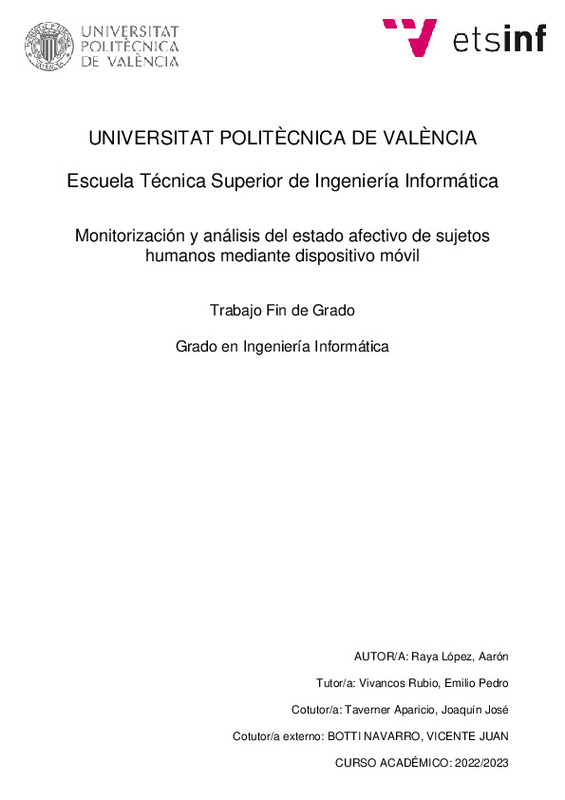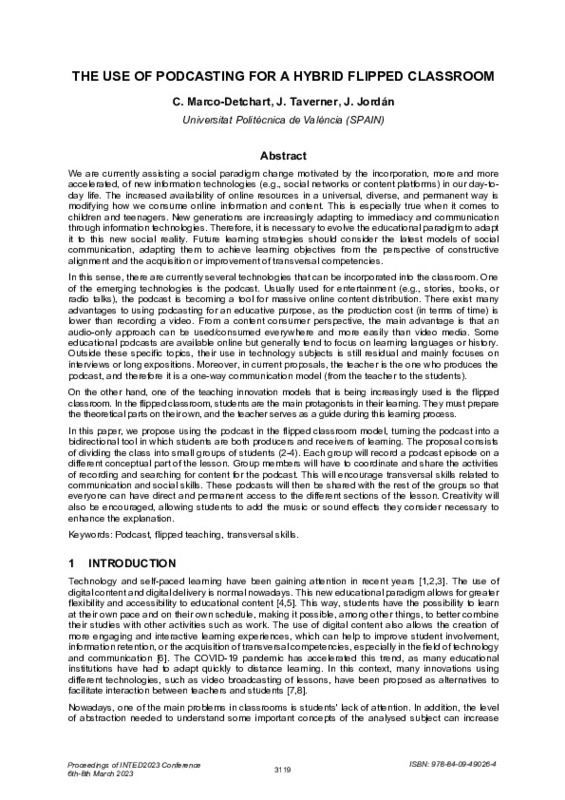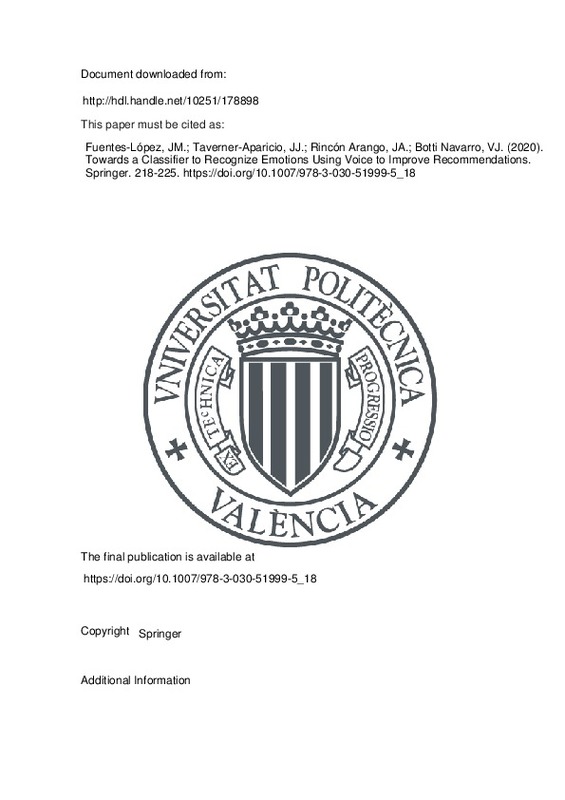

Listar por autor "Taverner Aparicio, Joaquín José"
RiuNet: Repositorio Institucional de la Universidad Politécnica de Valencia
- RiuNet repositorio UPV
- :
- Listar por autor
JavaScript is disabled for your browser. Some features of this site may not work without it.
Buscar en RiuNet
Listar
Mi cuenta
Ayuda RiuNet
Admin. UPV
Listar por autor "Taverner Aparicio, Joaquín José"
Mostrando ítems 1-14 de 14
-
Taverner Aparicio, Joaquín José (Universitat Politècnica de València, 2022-02-28)[ES] Los seres humanos somos por naturaleza seres afectivos, las emociones, el estado de ánimo, nuestra personalidad, o nuestras relaciones con los demás guían nuestras motivaciones y nuestras decisiones. Una de las ...
-
Taverner-Aparicio, Joaquín José; Vivancos, Emilio; Botti Navarro, Vicente Juan (Elsevier, 2021-02-06)[EN] Humans use rather vague and imprecise words to express emotions. Therefore, fuzzy logic allows computational affective models to use emotions in the same way that human beings express them. However, people from different ...
-
Taverner-Aparicio, Joaquín José; Vivancos, Emilio; Botti V. (Institute of Electrical and Electronics Engineers, 2023-03-01)[EN] One of the main challenges in affective computing is the development of models to represent the information that is inherent to emotions. It is necessary to consider that the terms used by humans to name emotions ...
-
Navarro Chisvert, Eduardo (Universitat Politècnica de València, 2023-10-06)[CA] El projecte innovador combina el reconeixement facial amb la monitorització del ritme cardíac per monitoritzar el benestar emocional de les persones majors. Utilitza el reconeixement facial per detectar i analitzar ...
-
Computational Affective Knowledge Representation for Agents Located in a Multicultural Environment Taverner-Aparicio, Joaquín José; Brännström, Andreas; Durães, Dalila; Vivancos, Emilio; Novais, Paulo; Nieves, Juan Carlos; Botti V. (SpringerOpen, 2024-05-30)[EN] In this paper, we propose a new computational model for affective knowledge representation that will be used for affective agents located in a multicultural environment. To this end, we present the results of two ...
-
Taverner-Aparicio, Joaquín José; Marco-Detchart, Cédric; Jordán, Jaume; Vos, Tanja Ernestina (IATED, 2023-03-08)[EN] New generations are increasingly becoming more familiar with consuming audio-visual material through online platforms. Consequently, learning through IT-based tools is becoming more and more common. Nowadays, learning ...
-
Taverner Aparicio, Joaquín José (Universitat Politècnica de València, 2016-09-13)[ES] Los sistemas multi-agente están adquiriendo cada vez mayor importancia en el área de la tecnología de la información ya que proporcionan escalabilidad, adaptabilidad, versatilidad, autonomía y tienen una alta ...
-
Caravaca Rostoll, Jordi (Universitat Politècnica de València, 2023-09-19)[CA] En l’àmbit de la representació computacional de les emocions i la seua implementació en agents intel·ligents, aquest projecte s’enfoca a explorar com capturar i modelar de manera efectiva les emocions humanes, tenint ...
-
Alfonso, Bexy; Taverner-Aparicio, Joaquín José; Vivancos, Emilio; Botti, V. (MDPI AG, 2021-11)[EN] The links between emotions and rationality have been extensively studied and discussed. Several computational approaches have also been proposed to model these links. However, is it possible to build generic computational ...
-
Taverner Aparicio, Joaquín José (Universitat Politècnica de València, 2017-08-29)When it is desired to imitate human behavior using software agents it is necessary to add affective characteristics that allow the agents to make the decisions in a more similar way as we do the human beings. One of the ...
-
Raya López, Aarón (Universitat Politècnica de València, 2023-09-07)[ES] El aumento de la esperanza de vida ha traido consigo que un grán número de personas mayores presenten signos de deterioro en su salud emocional y cognitiva. En este deterioro han influido múltiples factores sociales ...
-
Ruiz-Dolz, Ramon; Taverner-Aparicio, Joaquín José; Heras, Stella; García-Fornes, A. (Springer-Verlag, 2024-03)[EN] One of the greatest challenges of computational argumentation research consists of creating persuasive strategies that can effectively influence the behaviour of a human user. From the human perspective, argumentation ...
-
Marco-Detchart, Cédric; Taverner-Aparicio, Joaquín José; Jordán, Jaume (IATED, 2023-03-08)[EN] We are currently assisting a social paradigm change motivated by the incorporation, more and more accelerated, of new information technologies (e.g., social networks or content platforms) in our day-today life. The ...
-
Fuentes-López, José Manuel; Taverner-Aparicio, Joaquín José; Rincón Arango, Jaime Andrés; Botti Navarro, Vicente Juan (Springer, 2020-10-09)[EN] The recognition of emotions in tone voice is currently a tool with a high potential when it comes to making recommendations, since it allows to personalize recommendations using the mood of the users as information. ...
Mostrando ítems 1-14 de 14

Universitat Politècnica de València. Unidad de Documentación Científica de la Biblioteca (+34) 96 387 70 85 · RiuNet@bib.upv.es


